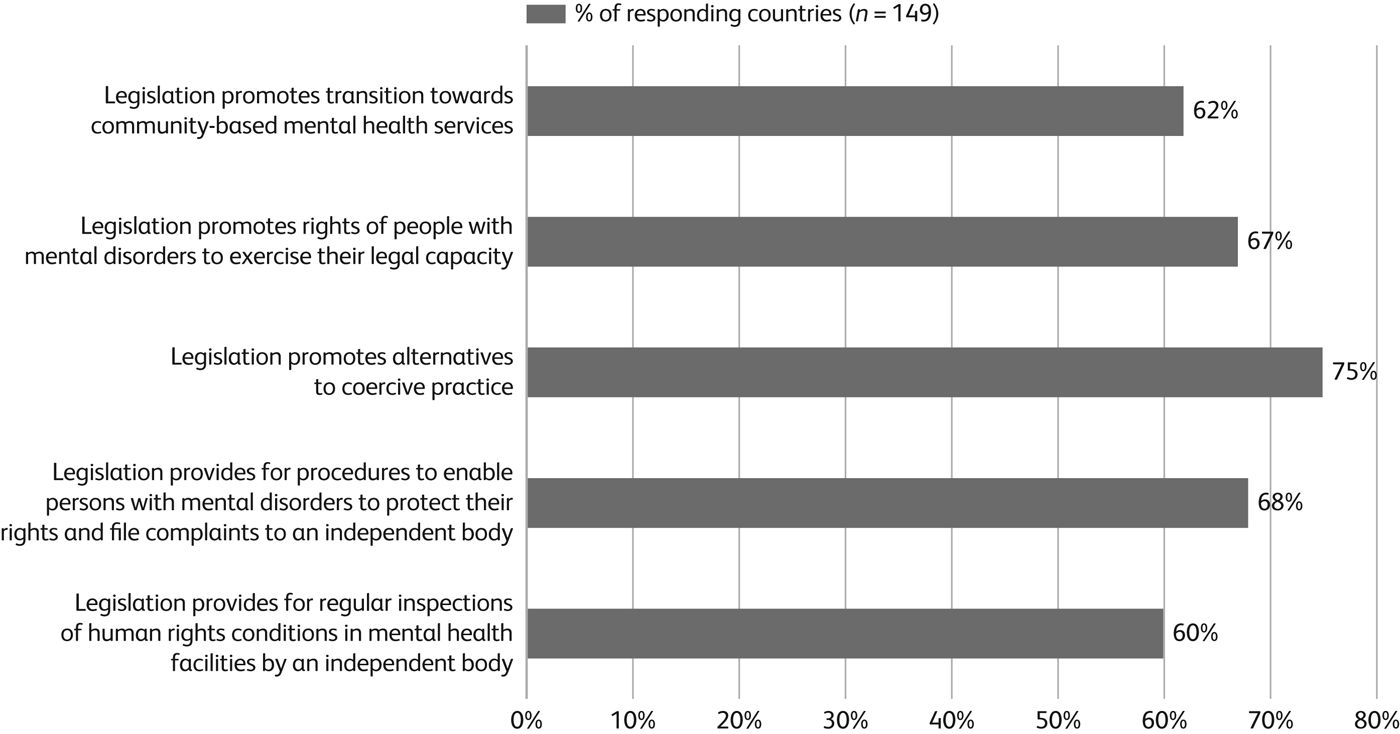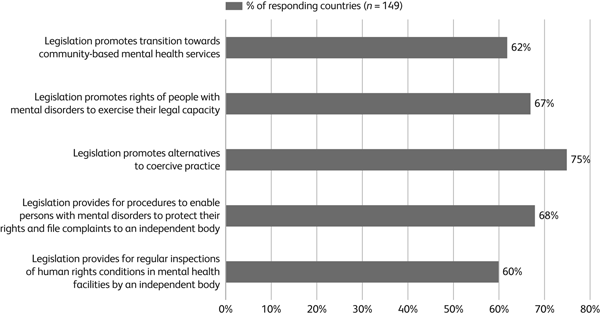The history of psychiatry has tended to reflect a paternalistic attitude towards patients. This was an ingrained characteristic of psychiatric institutions and, although deinstitutionalisation appears to challenge this power dynamic, mental health professionals (especially psychiatrists) continue to play a gate-keeper role in most countries; they act as state-sanctioned decision makers with the power to override the wishes of some patients in certain circumstances. Despite the obvious conflicts with rights to autonomy and self-determination, this power has largely been codified in law – or widely used in practice when not under a legal framework – and has widespread public acceptance. However, the 2007 Convention on the Rights of Persons with Disabilities (CRPD), which has been ratified by most countries, challenges this legislation that allows professionals to take decisions on behalf of patients (based on presumed best interest and the legal checks and balances intended to protect patients' rights) (Szmukler et al, Reference Szmukler, Daw and Callard2014).
The CRPD aims to highlight rights which, although universal, are often denied to people with disabilities because they face particular barriers in realising the rights that are taken for granted by other members of the population. The purpose of the Convention is to ‘promote, protect and ensure the full and equal enjoyment of all human rights and fundamental freedoms by all persons with disabilities, and to promote respect for their inherent dignity’ (United Nations General Assembly, 2007, p. 4). The provisions of the Convention also apply to people with psychosocial disabilities – people who are disabled due to a mental illness and whose ability to function and participate fully in society is thus affected. The implications of this Convention are profound and are still being negotiated on many levels. In fact, many countries who signed and ratified the Convention did not fully consider that their national mental health legislation would put them in contravention of the CRPD. The World Health Organization (WHO) Mental Health Atlas (WHO, 2014) reviewed compliance of national mental health legislation with major human rights instruments and found a fair level of alignment to key principles (Fig. 1), although levels of implementation were low, particularly in low-income countries.

Fig. 1 Compliance of mental health legislation with human rights instruments (from WHO, 2014).
One important consideration is whether mental illness is similar to other impairments in the way that it results in disabilities. Severe and prolonged mental illness can result in a profound loss of function (in terms of thinking, cognition, relationships, work and social interaction). However, for many people, mental illness can be less permanent and stable than physical or sensory impairments. For example, the severity of symptoms might change significantly from day to day (or over a year), and in many cases are substantially treatable or may even be completely reversed. It is important that the distress associated with life's challenges is not labelled as disability in a process akin to medicalisation. Although self-identification of disability status is the simplest and most appropriate solution to these questions in principle, such issues remain the central challenge in attempting to codify, for example, fair access to disability payments.
In relation to national legislation on mental health, controversy has particularly grown around the provisions of the CRPD that guarantee the right to ‘equal recognition before the law’ (Article 12, outlining legal capacity), which implies a right to self-determination and autonomy (e.g. in treatment decisions), and ‘liberty and security of the person’ (Article 14), which prohibits deprivation of liberty on the basis of a disability (i.e. physical or chemical restraint, or being held in a hospital against a person's consent). Almost all countries, including the UK, are in contravention of these articles, as highlighted in periodic national reports by the CRPD Committee (CRPD, 2017). Despite ratifying the Convention, many countries have asserted their intention to continue following current practice around treatment, guardianship and containment. This is largely based on what has been termed ‘substitute decision-making’, where decisions are made on behalf of the affected person. Instead, the CRPD promotes ‘supported decision-making’, where the focus is always on what the affected person wants or would want.
The Committee implementing the CRPD has issued a General Comment and guidelines on Articles 12 and 14 in response to these contraventions (CRPD, 2014, 2015), clearly reasserting that it is contrary to the Convention to detain a person on the basis of their impairment (even in the case of perceived dangerousness, for example) and that all people should be held equally to account under general laws. Some have argued, however, that to not provide special provision for people with mental illness while they are particularly vulnerable, which may result in worse health and social outcomes for them, is in contravention of their right to health, or even their right to life – e.g. in the case of suicide risk (Freeman et al, Reference Freeman, Kolappa and de Almeida2015).
A 2017 report by the Special Rapporteur on the Right to Health largely reasserted this position and highlighted the problems of power imbalances, dominance of biological models of psychiatry and biases in these research models. However, it recognised the important contribution of mental health services to realising rights, and that there was space for gradual realisation of the reforms necessary to achieve access to these rights (UN HRC, 2017a). Following this report, the United Nations Human Rights Council passed a key Resolution that has further raised the profile of the topic (UN HRC, 2017b). Increased attention to rights is also reflected in the World Psychiatric Association's Bill of Rights (WPA, 2016), the endorsement of a position statement on human rights by the American Psychiatric Association (Sorel, Reference Sorel2017) and the establishment of a review of legislation in the UK. However, it is clear that these different initiatives are not entirely compliant with international rights instruments, especially the CRPD (Lewis & Callard, Reference Lewis and Callard2017).
These developments represent a major challenge to the current focus of most legislation and to the assumptions that have underpinned mental health service provision to date. However, although there is divergence on the fundamental issue of treatment without consent in certain circumstances, there is a general consensus that services continue to fail on basic measures of dignity and quality standards if parity with physical health services is expected. The WHO uses this standard in the QualityRights initiative: a resource that has been developed to support countries and other actors in improving the quality of services and access to rights within those services. This initiative includes a toolkit for evaluating services as well as training materials to support reform and improvement of services (WHO, 2017). These resources and others, such as the manual produced by the World Network of Users and Survivors of Psychiatry (WNUSP, 2008), are being reinforced by further work to demonstrate alternatives to coercive practices, ensuring participation of patients and more person-centred approaches. These initiatives will help to take the principles espoused in human rights instruments and legislation towards being realised in practice.
Such efforts at service reform are framed within an explicit rights-based approach. More broadly, recent progress in global mental health and its increased recognition as a contribution to international development (Patel et al, Reference Patel, Saxena and Frankish2016) also brings the possibility of dramatically revolutionising access to rights for people with mental illness. To maximise this impact, the psychiatric field must maintain a critical reflection of its (positive and negative) effects on human rights. Human rights were at the core of the initial aims of global mental health (Lancet Global Mental Health Group, 2007) and should continue to be a primary consideration in setting the agenda for the future.




eLetters
No eLetters have been published for this article.